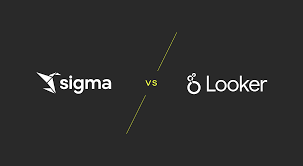Looker Developer vs. Sigma: Navigating Your Data Analytics Developer Career Path" on Sigma Computing's blog provides an in-depth comparison of career paths for data analytics professionals using Looker and Sigma. It highlights the pros and cons of each platform and their impact on career growth and marketability.
Looker Developer Path
Strengths:
Data Modeling and BI Capabilities: Looker is known for its robust data modeling capabilities using LookML, a powerful but complex language for creating custom data models and visualizations.
Custom Visualizations: Advanced features enable highly customized visualizations and integration with various data sources.
Career Opportunities: Expertise in Looker can secure long-term roles in organizations deeply invested in the platform.
Weaknesses:
Steep Learning Curve: Mastering Looker requires significant time and effort due to the complexity of LookML and the need for deep coding knowledge.
Niche Market: The job market for Looker developers is narrower compared to more widely used BI tools like Tableau or Power BI, limiting job opportunities in regions or industries where Looker isn't prevalent.
Evolving Market Dynamics: The rapid evolution of BI technologies means Looker developers must continually adapt to new tools and trends, which can be challenging and stressful.
Sigma Developer Path
Strengths:
User-Friendly Interface: Sigma offers an intuitive design that caters to both technical and non-technical users, promoting broader adoption across teams.
Real-Time Data Exploration: Users can explore data in real-time without the need for preprocessing or extensive data manipulation, facilitating quicker insights and decision-making.
Integration and Flexibility: Sigma seamlessly integrates with major cloud data warehouses like Snowflake, Google BigQuery, and Amazon Redshift, making it a versatile tool for diverse data ecosystems.
Scalability and Security: Built for enterprise-level operations, Sigma provides robust scalability and security features suitable for handling large and complex datasets.
Career Growth and Training
Learning Resources: Sigma provides extensive training resources, including a learning portal with step-by-step guides, webinars, live events, community forums, and comprehensive documentation.
Portable Skills: Skills developed on Sigma, such as SQL proficiency, data modeling, and data visualization, are highly portable and applicable across various BI tools and platforms.
Market Demand: Sigma's growing popularity and adoption across industries present ample career opportunities and job stability for professionals proficient in its use.
Comparison Summary
Both Looker and Sigma offer unique advantages for data analytics professionals. Looker provides robust data modeling and customization capabilities but comes with a steep learning curve and a more niche market. In contrast, Sigma's user-friendly approach, real-time data exploration, and extensive integration options make it a versatile and increasingly popular choice.
Conclusion
Choosing the right platform for your career depends on your technical background, learning preferences, and market demand. Looker can be highly rewarding for those who master its complexities, but Sigma offers a more accessible and broadly applicable skill set that can enhance career growth and versatility. For further details, read the article 3 Cons to Being a Looker Developer.
